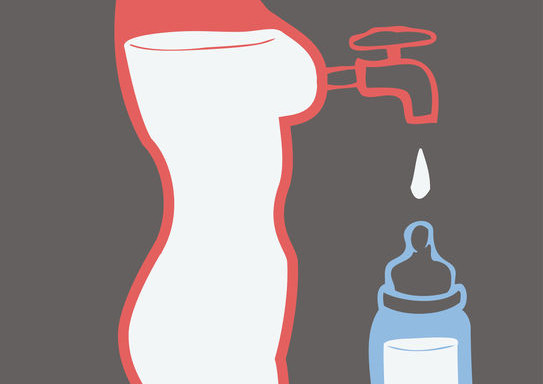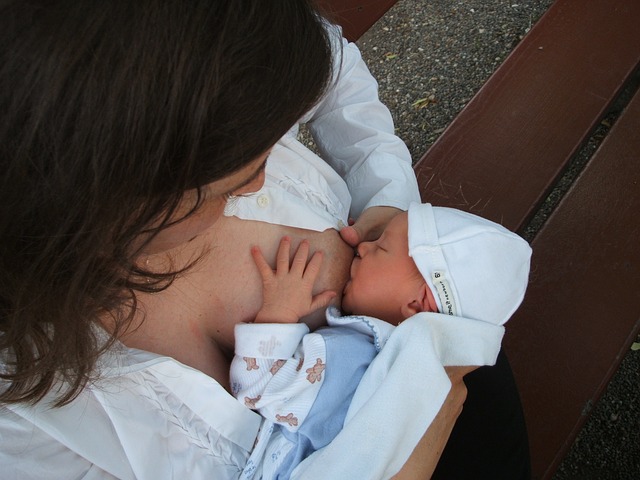So you have made the firm decision to breastfeed your newborn baby instead of bottle feed. You have prepared yourself, emotionally, physically and psychologically because you strongly believe that breastfeeding is far more beneficial than formula milk.
But what if you realize that you are not producing sufficient milk for your baby’s daily needs? What should you do?

How you can increase your breast milk supply
1. Eat a balanced diet
Eating the right kind and amount of food is the first remedy to insufficient milk supply. A balanced diet should include food rich in fats, vitamins, protein, carbohydrates and minerals. Since breastfeeding helps in losing weight naturally, you might eat slightly more to make up for losing 500 calories per day.
Fruits and vegetables are the best options while junk and fast foods should be abstained. The stored fat gained during pregnancy may be a bother to every mother, however, it is not advisable to engage in any weight loss programs as this may distort milk production and may weaken your body.
2. Drink plenty of fluids

Fluids help to regulate the flow of blood and nutrients inside the body. This may not refer to drinking water alone. Fluid can also be gained through eating fruits, drinking milk and other healthy beverages.
Aside from taking in at least one gallon of water every day, it is advisable for mothers to drink herbal or tonic soup to replace the body fluids lost during breastfeeding, and to increase milk production.
3. Take supplements or continue to take prenatal vitamins
Herbal remedies and therapy are believed to help increase breast milk supply. Fenugreek capsules have been proven to increase breast milk production within 72 hours after taking 3 capsules for the first ten days after birth.
However, Fenugreek is not recommended to women suffering from asthma or diabetes and there are also side effects such as profuse sweating. As safe as they may seem, herbal remedies or any form of supplements should be taken with the advice of health professionals.
4. Get enough rest and sleep
A calm and rested body is necessary for proper milk production. Having enough rest promotes enough time intervals for feeding your baby. At least two hours of regular intervals can stimulate the efficient supply of milk in your breasts.
5. Express milk in between feedings
You can stimulate your breast milk production by expressing milk out of your breasts, even right after feeding. Pumping your breast 8-12 times a day requires a lot of patience, but when done on a regular basis, this will lead to an enjoyable feeding experience for you and your baby. Buy a good breast pump and position your body in a comfortable position. Expressed milk can be stored in the fridge for feeding whenever you are out for work or for other appointments.
6. Massage your breasts
Breast stimulation for milk production can be done through a simple gentle massage. This can be done during or in between feedings. The best about massages is that you can do it yourself, when you take a bath or when you lie down to relax.
7. Avoid or lessen exposure to stress factors

Avoid engaging in vigorous activities that deplete your energy and burn you out. Research has shown that mothers who are stressed and tired may not produce sufficient breast milk supply. When your household chores begin to pile up, ask for help. Keep your mind focused on your body and make the most out of your time to strengthen bonds with your baby and family.
8. Avoid cigarettes, alcohol and caffeine

Caffeine, liquor and cigarettes are not only harmful to you, but to your baby as well. What you consume can be transmitted to your baby, through your breast milk. So be mindful of what you eat and drink.
We also asked Ms Loh Lee Lian, a Certified Lactation Consultant at Mount Elizabeth Hospital with 34 years of experience for more tips on how to increase milk supply.

#1 The first hour
Nurse your newborn within an hour after birth and maintain as much skin-to-skin contact as possible because a baby feeds well when he is warm. When the baby is breastfeeding well, there is demand and thus milk supply will follow.
#2 Rooming-in at the hospital
Rooming-in day and night enables a mother to respond to a baby’s hunger cues and to feed frequently to maintain supply.
#3 Feed on demand

Feed your baby on demand, and not on a fixed schedule or time. Your baby should be fed based on hunger cues and demands, as the appetite varies with each feed. Frequent unlimited feeding stimulates your body to produce more milk and effective removal of milk helps to prevent stagnation and breast engorgement.
Breastfeeding is based on demand and supply. Where there is regular demand, i.e. when a baby suckles on the breast, the body will stimulate the release of the hormones Prolactin and Oxytocin, which activates the milk supply. Supply may be affected by psychological causes such as anxiety, worry, and lack of sleep.
#4 Massage your breasts
Encourage milk letdown and flow by massaging your breasts and applying warmth to the breasts before nursing.
#5 Get a good latch on
Establish a good position and correct latching techniques to ensure effective milk transfer during suckling. Avoid bottles, pacifiers or nipples shields in the first few weeks, unless absolutely necessary Avoid milk formula unless medically indicated.
#6 Eat a balanced diet and drink up
Nursing mothers should eat a healthy, balanced and nutritious diet, as 500 calories more are needed daily to produce breast milk. A mother needs to be sufficiently hydrated to maintain milk supply. Take plenty of fluids.
#7 Get enough rest
Support and encouragement from family members on breastfeeding and with sufficient rest and sleep in-between will provide positive emotional well-being and thus influence good milk production.
#8 Supplements
Taking breast milk supplements or Galactogoques may help to increase milk flow. Examples of herbal supplements that may help are Fennel Tea, Fenugreek capsules, Blessed Thistle tea. These can be bought off the counter. Doctors may also prescribe medication such as Domperidone and Metoclopromide.
#9 Seek professional help
To avoid any breastfeeding problems, do see a lactation consultant to ensure that position and latching is done correctly from the start, to avoid nipple sucking. This will ensure that the baby is removing milk effectively at each nursing session.
This article is part of Breastfeeding with Love campaign, initiated by The New Age Parents and New Age Pregnancy.
Join the Breastfeeding with Love Group to find out more and be part of our breastfeeding online community!
Click on the logos to find out more about our supporting partners.
|
|
* * * * *
Like what you see here? Get parenting tips and stories straight to your inbox! Join our mailing list here.
Want to be heard 👂 and seen 👀 by over 100,000 parents in Singapore? We can help! Leave your contact here and we’ll be in touch.




















































